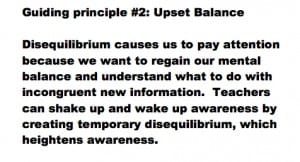Surprise is a great tool for teachers because it makes learners pay close attention. When we introduce an idea or method that is incongruous to our learners previous conceptions, or use a method or tool that is unfamiliar or strange, all learners’ senses are “up and engaged”. When learners must struggle to understand, or are challenged to make sense of something, this means they are paying close attention with all the mental tools they have. It also means they can’t file this new information away and forget about it.
I like to upset the balance at the beginning. When adults working on their pronunciation must “regroup” or consider a sound, for example, from a new perspective, they are opening up their minds to alternate ways of processing. We must put their minds at ease first because they are adults and satisfy them with patterns and analysis, however change comes when we are faced with the unexpected. Give them an experience they can’t tuck away into a framework that’s been entrenched in their minds for years.
Sometimes it’s an odd and unexpected experience: I use physical gestures that I’ve perfected over the years, which are tied to articulation movements in the mouth. It’s amazing how the right accompanying gesture will make articulation easier to master.
Sometimes it’s a shocking or challenging experience: adults who listen to minimal pairs are sometimes shocked to learn they can’t hear the difference between some of the minimal pairs, and this becomes a motivator for them–they realize that if they can’t hear the difference, they may not be pronouncing them differently either. I use http://www.manythings.org/pp, and wish there were more of these.
Sometimes it’s an visual experience: I show adults how sound “looks” using Audacity or SoundCloud to demonstrate how their sounds should look, and do look.
The students who changed the least or took the longest, were those who came believing they knew what the problem was, with their own agenda, and dictated what they wanted to work on or improve. Those who changed the most were those who found a way to live with that early period of disequilibrium and think of themselves as learners. They were able to forge a new understanding of English as a sound system separate and unique from their birth language.

